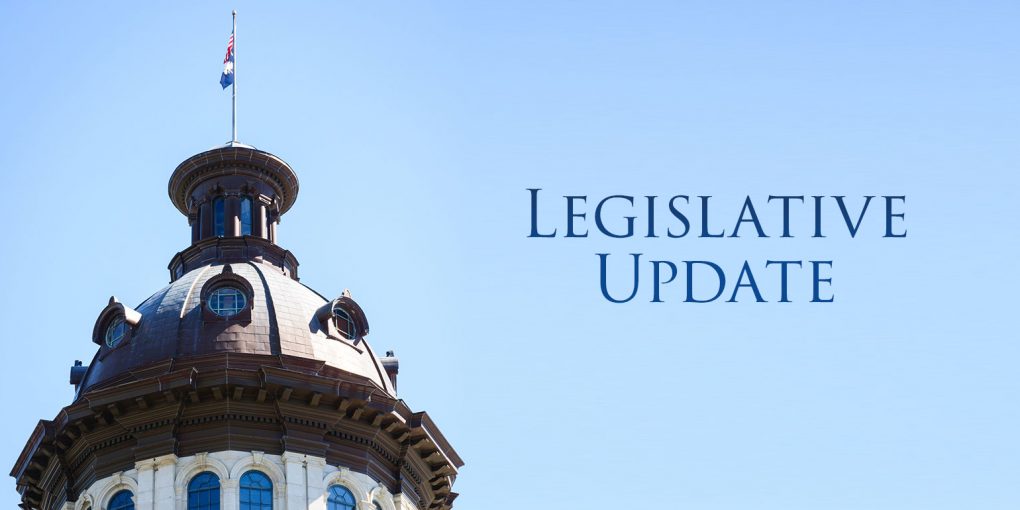LEGISLATIVE UPDATE : April 8-12, 2019
Wednesday of this week, April 10, marked the General Assembly “crossover” deadline. Crossover is the last day for a bill to pass out of the chamber in which it was introduced, with a simple majority vote, for it to be considered in the opposite chamber. The crossover deadline is a critical deadline for Senate bills to be sent to the House for consideration in this legislative session. The Senate bills listed below received a third reading prior to the crossover deadline.
On The Floor:
TORT CLAIMS — Referred to as a ‘tort,’ a civil wrong that may cause a claimant to suffer loss, injury or harm may occur specifically at the hands of a government entity or political subdivision. Senate Bill 7 increases increase the limits from a loss, under the Tort Claims Act, from a single occurrence for persons to five hundred thousand dollars and total sum arising out of a single occurrence to one million dollars. Additionally, a party who files an offer of judgement shall be allowed to recover administrative, filing or other court costs, and eight percent interest on the amount of the verdict from the date of the offer. The bill now heads to the House for further consideration.
CHILD TORTURE — Children are among the most vulnerable, and must be ensured protection. Senate Bill 189 cements that it is unlawful to commit torture or allow torture to be committed against a child and further define terms. ‘Torture’ includes, but is not limited to, inflicting or participating in or assisting in inflicting intense physical or emotional pain upon a child repeatedly over a period of time for the purpose of terrorizing the child or for the purpose of satisfying the sadistic, craven, cruel or prurient desires of the perpetrator or another person. A person is guilty of homicide by child abuse if the person causes the death of a child while committing torture or knowingly aids and abets another person to commit torture that results in the death of a child. Homicide by child abuse is a felony and a person who is convicted must be imprisoned for life or must be imprisoned for a term of not less than twenty years. The bill now heads to the House for further consideration.
CHILDCARE FACILITY REGISTRY — A bill to prohibit a childcare facility from employing a caregiver or other staff that is registered or required to register on the National Sex Offender Registry, State Sex Offender Registry, or Central Registry, and State Child Abuse and Neglect Registry. The bill now heads to the House for further consideration.
CHILDCARE FACILITY BACKGROUND CHECKS — Senate Bill 601 seeks to provide additional protections for those who care for children in childcare facilities. The bill provides restrictions on foster care or adoption placements to add background check requirements from each employee of a residential facility where children in foster care may be placed. No child in custody of the Department of Social Services may be placed in a foster home, adoptive home or residential facility if the person has a substantiated history of child abuse or neglect or has pled guilty or nolo contendere or has been convicted to offenses outlined in the section. The bill now heads to the House for further consideration.
EDUCATION OPPORTUNITY — Consolidation of school districts in certain instances have shown to provide an improved educational opportunities to children and cost savings to the district. Senate Bill 203 provides criteria for school district consolidation under certain circumstances. On or before August 1, 2022, any local school district that meets characteristics shall be eligible to receive appropriated funds for the purpose of consolidating with other districts within its county. Among the standards is a school in which if the daily membership is less than one thousand five hundred, and located within Tier IV county in the 2018 tax year. Eligible districts must submit a preliminary consolidation plan and timeline to the Department of Education for review and use of funds. The eligible district may not incur new bond indebtedness, spend existing district reserves, dispose of district assets or increase the salary of any district employee without prior approval by the Department, unless otherwise directed by the General Assembly. The bill now heads to the House for further consideration.
THREATENING WITH DANGEROUS WEAPON — Senate Bill 276 provides that it is unlawful for a person to threaten, solicit another to threaten, or conspire to threaten to cause damage, serious bodily injury, or death. This bill also provides it unlawful to cause damage to or destroy a building or other real or personal property by use of a dangerous weapon on any premises or property owned, operated, or controlled by any post-secondary institution, in a church, in any publicly owned building or recreational park areas or in a public gathering place. A person charged may, as a condition of his bond hearing and any subsequent bond hearing, undergo a mental health evaluation. If the evaluation reveals the person needs mental health treatment, then the court shall require him to undergo mental health treatment or counseling. The Department of Mental Health shall study the scope of applications and financial impact of this act and shall annually make a report to the General Assembly containing its finding by January 1 beginning in 2020. The bill now heads to the House for further consideration.
MISREPRESENTING SERVICE ANIMALS — Animals trained to provide service can provide great care and support to individuals with a disability or need. Unfortunately, some fraudulently claim the use of animals for service which undermines lawful use of service animals. Senate Bill 281 provides the needed clarity for service animals by making it unlawful for a person to intentionally misrepresent an animal as a service animal or service animal in-training for the purpose of obtaining any right provided to a disabled person, and provide penalties. Inquires made in order to investigate are limited to those inquires allowed by the Department of Justice. A uniform traffic ticket may be used for the arrest. Landlords may request documentation to verify tenant’s lawful use of a service animal, which shall be deemed sufficient if it establishes an individual has a disability and the animal will provide disability-related assistance or support. The bill now heads to the House for further consideration.
CERTIFYING CORONER AND SHERIFF CANDIDATES — Senate Bill 17 provides that the duties of the county boards of voter registration and elections are responsible for certifying that county’s candidates for country coroner and country sheriff. The bill now heads to the House for further consideration.
TRANSPORT OF PERSONS OF MENTAL ILLNESS — Transportation individuals believed to to have a mental illness is a need and must done with care. Senate Bill 303 provides that a state or local law enforcement officer responsible for transporting a patient believed to have a mental illness must be part of the therapeutic transport unit and have undergone mental health and crisis intervention training to provide that a physician is responsible for the patient’s care and must notify a friend or relative that they may transport the patient to the facility, and that the friend or relative freely chooses to assume the responsibility and liability for the transport. The bill now heads to the House for further consideration.
ALCOHOL SERVER TRAINING — Senate Bill 342 enacts provisions to provide training and responsibility for those who serve alcohol. The “Responsible Alcohol Server Training Act” implements and enforces mandatory alcohol server training and education programs to businesses to obtain alcohol server certificates. This requires servers of all alcoholic beverages for on-premises consumption in licensed or permitted businesses to obtain alcohol server certificates, and to require fees from providers of training programs and from applicants for alcohol server certificates. Training programs must only be either online or in the classroom. Topics covered in this bill include, but are not limited to, state laws regulation alcohol purchasing, liquor liability issues, impaired driving or driving under the influence, information on blood alcohol concentration and factors that change this, the effect alcohol has on the human body and human behavior, methods of refusing to serve or sell alcoholic beverage to individuals under twenty-one years of age and intoxicated individuals, methods for properly and effectively checking the identification of an individual, for identifying illegal identification, and life consequences, like losing education scholarships, relating to minors use. The bill now heads to the House for further consideration.
NAVAL CRIMINAL INVESTIGATION AUTHORITY — Senate Bill 413 adds Naval Criminal Investigative Service Agents to the list of authorized federal law enforcement officers to enforce the state’s criminal laws. The bill now heads to the House for further consideration.
PORT CARGO TAX CREDIT — A bill, S.439, increases the maximum amount of tax credits allowed to all qualifying taxpayers from eight million to fifteen million dollars for each calendar years, as it relates to cargo volume, port transportation, transportation of freight, good and materials. The bill now heads to the House for further consideration.
FINGERPRINT BACKGROUND CHECKS — Senate Bill 480 relates to South Carolina Law Enforcement Division to provide that an agency authorized to conduct fingerprint background checks in this state may conduct a federal fingerprint review to provide that SLED, upon request, may submit the fingerprints collected by agencies to the Federal Bureau of Enforcement Division. SLED and the FBI may retain collected fingerprints and search any retained fingerprints later pursuant to an appropriate inquiry. The bill now heads to the House for further consideration.
REAL ESTATE BACKGROUND CHECKS — Senate Bill 649 provides that certain real estate professionals must undergo criminal background checks for initial applications for licensure and for licensure renewals, as well as property managers and property managers-in-charge. Each of the provisions is effective for initial license applications or renewals due on or after July 1, 2020. The bill now heads to the House for further consideration.
GOLF CART ALLOWANCES — Senate Bill 666 allows a municipality with a land area of approximate 3.87 square miles and a population estimated as of July 1, 2017, to be between ten and eleven thousand persons by the United States Census Bureau’s Population Estimate Program that is located within a county that had a population of two hundred twenty-six thousand seventy-three persons according to the 2010 United States Census may enact an ordinance allowing the operation of a permitted golf cart for up to sixty minutes after sunset on locally owned roads for which the posted speed limit is twenty-five miles an hour or less if the golf cart has operable headlights and brake lights. The bill now heads to the House for further consideration.
In Committee:
Senate Finance Committee:
S.678 – Local Government Fund: A bill relating to the Local Government Fund to provide that in any fiscal year in which general fund revenues are projected to increase or decrease, the appropriation to the LGF must be adjusted by the same projected percentage change, but not exceeding five percent. The adjustment must be determined by the Revenue and Fiscal Affairs Office with the Board of Economic Advisors’ most recent projection of recurring general revenue.
Senate Labor, Commerce and Industry Committee:
S.394 – Auxiliary Containers: A bill to provide that any regulation regarding the use, disposition, sale or imposition of any prohibition, fee, imposition or taxation of auxiliary containers must be done only by the General Assembly. The article supersedes and preempts any ordinance enacted by a political subdivision that purports to regulate at the retail, manufacturer or distributor level. The provision does not limit any recycling program, or ordinance pertaining to the use of auxiliary containers on exempted properties such as state, county, or municipal park or properties including coastal tidelands, wetlands, public beach, river or other body of water.
S.506 – Housing Authority Commissioners: A bill to provide that a county legislative delegation may adopt a resolution declaring that there exists a state of emergency with regard to a municipal housing authority that if convincing evidence or action or failure to act in which residents are subjected to unreasonably hazardous conditions or being subjected to conditions that led to the death or one or more residents, the commissioners are immediately suspended from office for ninety days. During this period of suspension, the mayor, or the mayor’s designee, shall exercise the powers and duties of the housing authority. Concurrently, the council of the municipality shall conduct an independent investigation into the circumstances under which the state of emergency was declared. Commissioners shall have the right to be heard in person or by counsel during the mayor’s investigation. If the council determines the authority took action or failed to take action meeting the conditions, the commissioners are immediately removed from office and the council shall appoint new commissioners.
For more questions on the above bills or additional legislation being considered by the Senate, please reach out! WE WANT TO HEAR FROM YOU.
###



